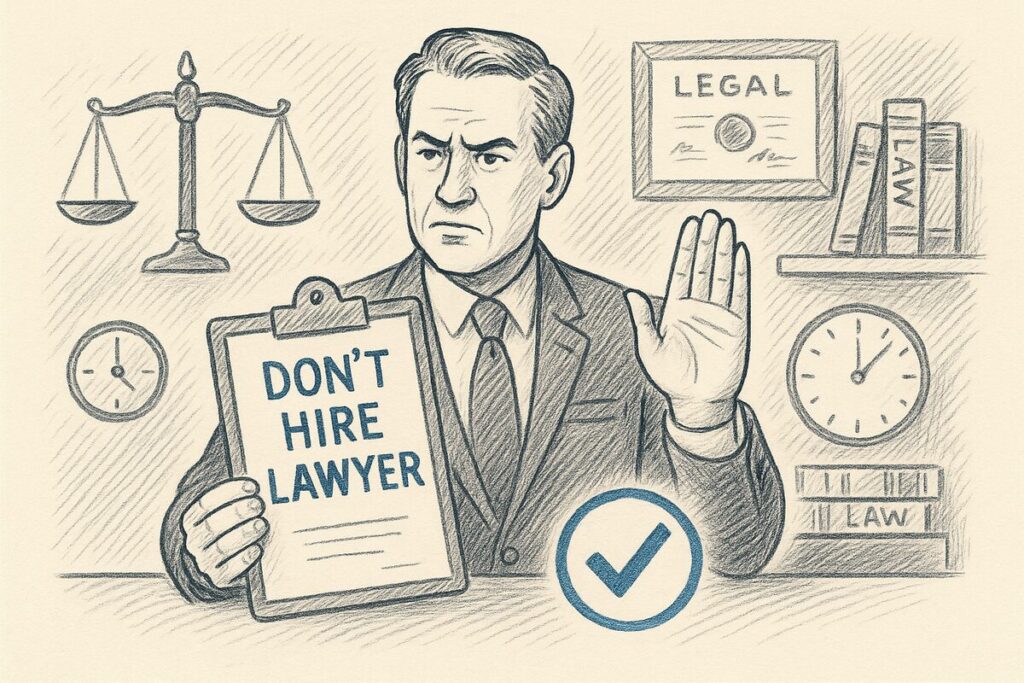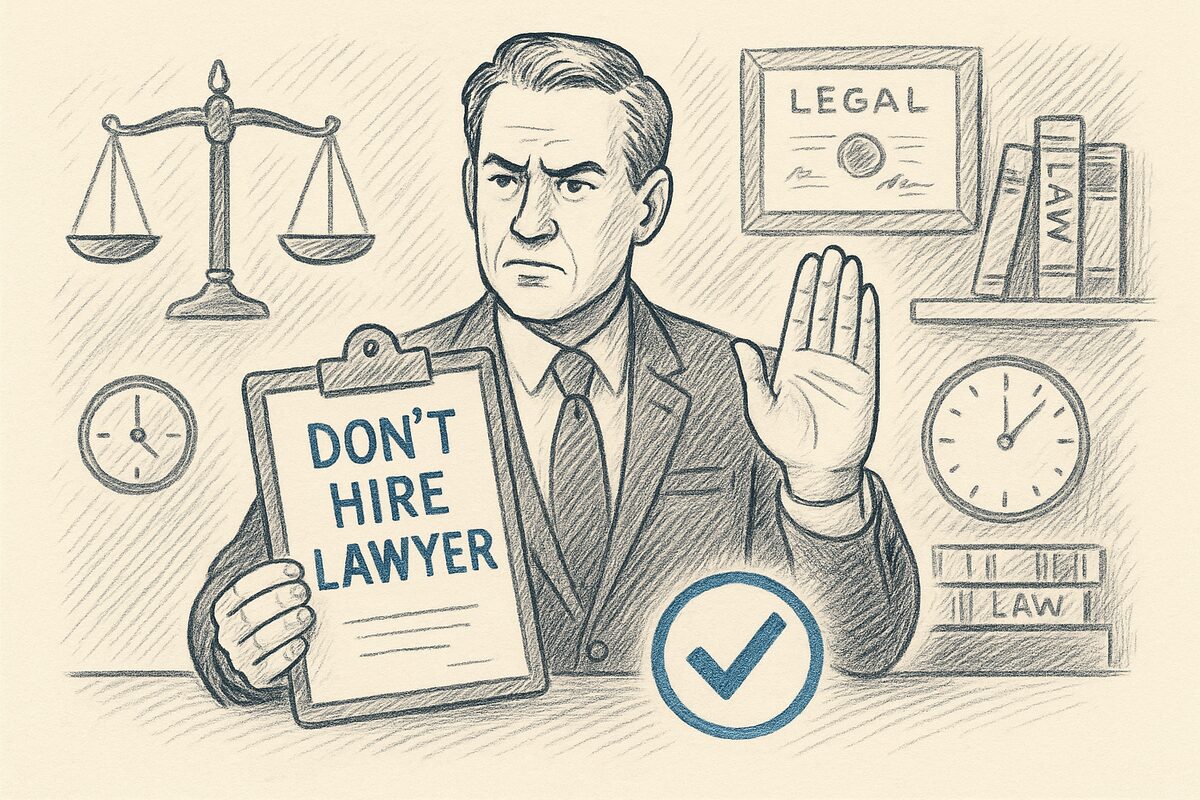I’ve had this conversation more times than I can count.
It starts with a potential client calling me, and it ends with me explaining why they probably shouldn’t hire me.
It might sound strange coming from an attorney who bills by the hour, but I’ve had countless conversations where I’ve advised people not to retain me — not because they’re wrong, unreasonable, or unable to pay, but because sometimes, hiring a lawyer doesn’t make financial sense for the situation they’re in.
My job isn’t to rack up billable hours. It’s to do my best to put the client in a better position than they were in when they picked up the phone. And in some cases, the best advice I can give is that they’re better off not hiring me..

When the Legal Fees Outweigh the Problem
Let’s be honest, litigation is expensive. According to the Florida Bar’s 2023 Economics and Law Office Management Survey, 85 percent of attorneys in Florida charge more than $275 per hour, and over half charge more than $350 per hour, with many charging even more depending on experience and location. At those rates, legal fees can add up quickly, and there is no guarantee you will recover those costs, even if you win.
One of the first things I ask a potential client is, “How much money are we talking about?” A dispute involving over a million dollars is a very different conversation from one below Florida’s small claims threshold. If the legal fees could easily exceed what they’re trying to recover, they need to know that — and the sooner, the better.
Thanks to miles of billboards promising “no fees unless we win,” some people are under the impression that attorneys work for free until the end — or that they’re automatically entitled to recover their attorney’s fees if they win. The reality is more complicated, and assuming otherwise can end up costing more than the original dispute itself.
Florida Doesn’t Automatically Award Attorney’s Fees
Here’s something else that surprises a lot of people: even if you win, the other side doesn’t necessarily have to pay your legal fees.
In Florida, the default rule is simple: each party pays their own attorney, win or lose. There are only two major exceptions:
- A statute that specifically allows for attorney’s fees, or
- A written contract that includes a “prevailing party” clause.
For example, civil theft claims under § 772.11, Fla. Stat. entitles the prevailing party to recover their attorney’s fees, but only if strict notice and pleading requirements are met. Florida’s Construction Lien Law under § 713.29, Fla. Stat., also allows the prevailing party to recover attorney’s fees in lien enforcement actions.
Another common way to shift fees is through a prevailing party clause in a written contract. These clauses allow the winning side to recover their legal fees from the losing side and can have a major impact on how a dispute plays out. In some cases, the attorney’s fees awarded exceed the original amount in dispute, and litigation can turn into a fight over fees rather than the underlying issue. But that’s a topic for another day.
Here’s an example of a standard attorney’s fees clause you might see in a construction contract:
In the event of any legal action or proceeding arising out of or relating to this Agreement, the prevailing party shall be entitled to recover its reasonable attorney’s fees and costs from the non-prevailing party, including fees and costs incurred in pre-suit demands, litigation, trial, appeal, and collection efforts.
The bottom line is that even if you win, it could be a Pyrrhic victory that costs more than it’s worth. Without a prevailing party fee provision or a statute, even a clean win can still leave you paying more in legal fees than you recover.
Small Claims Court Exists for a Reason
For cases involving $8,000 or less, Florida’s small claims court provides a streamlined, cost-effective process that typically does not require legal representation.
When it makes sense, I often point potential clients toward small claims court. For less than a couple of billable hours, people can often handle it themselves and avoid spending thousands on an attorney.
However, small claims court works best when both sides are on relatively equal footing — think David vs. David. But once an experienced lawyer enters the courtroom with a strong contract that includes a prevailing party attorney fee clause, the whole dynamic changes. Small claims may sound informal, but it’s still real court. The rules of evidence apply, and the burden of proof is still on you. I’ve seen self-represented parties get steamrolled because they didn’t realize they could be on the hook for the other side’s legal fees if they lost.
So while small claims court is often a good option, it’s not always the right option. If there’s a fee-shifting provision in play, or if the other side is coming in lawyered up, it may be worth talking to an attorney — even if just for advice.
The Cost of Principle Can Be Expensive
Even though I approach cases from a practical standpoint, some potential clients (usually homeowners) tell me, “It’s not about the money — it’s the principle.” Or that. “I don’t want them to get away with it or do this to someone else.”
I get it. I really do. But litigation is often long and expensive, and courts don’t hand out damages for stress, frustration, or moral outrage. Once the lawsuit is filed and served, there is no guarantee of what will come out of it. If a potential client is prepared to spend thousands, or tens or hundreds of thousands, to make a point, that’s their right— and I’ll happily represent them and cash the checks.
That said, I usually recommend exploring other ways to hold someone accountable when litigation doesn’t make financial sense.
For Contractors and Subcontractors: Hire a Lawyer Before You Need One
My advice to contractors, subcontractors, trades, and suppliers is different than it is for homeowners. You shouldn’t wait until something goes wrong to call an attorney. Preventive legal advice is almost always cheaper, more effective, and far less stressful than trying to clean up a legal mess later. I never tell contractors they don’t need a lawyer—in fact, I believe every contractor should have one before problems arise. Whether it’s reviewing contracts or ensuring lien rights, getting legal advice early helps contractors stay ahead of problems and be better positioned if things go south.
The Honest Truth
Not every dispute needs a lawyer. Not every wrong needs to be made right in court. And not every phone call should end with a retainer agreement.
What everyone deserves, though, is honest answers. That’s why I don’t try to sell people on hiring me. My goal is to help them make the smartest decision for their situation—even if that means telling them they’re better off handling it without me. If your consultation sounds more like a sales pitch than legal advice, ask yourself whether the attorney you’re speaking with truly has your best interests at heart.
About the Author
John Martin, Esq., is an associate attorney at The Schatt Law Firm, PLLC, where he focuses on business and construction litigation.



